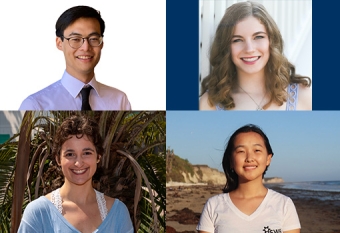
UC Santa Barbara chemical engineering graduate students, Michelle Baldini, Norleakvisoth Lim, and Elizabeth Schauer, and undergraduate Claire Wu have received prestigious 2022 graduate research fellowships from the National Science Foundation (NSF). Fellows in NSF’s Graduate Research Fellowship Program (GRFP) receive three years of financial support, totaling $138,000, in the form of an annual $34,000 stipend and an annual cost-of-education allowance of $12,000 paid to the graduate degree-granting institution for tuition and fees. Fellows also receive opportunities for international research and professional development.
The GRFP is the nation’s oldest fellowship program that recognizes and supports outstanding graduate students pursuing research-based graduate degrees in science, technology, engineering, and mathematics (STEM) disciplines. The program is intended to ensure the vitality and diversity of the nation’s scientific and engineering workforce, inspiring future contributions to research, teaching, and scientific innovation. Students can apply to the program before beginning or early in their graduate studies. On average, about 13,000 students submit applications each year.
Baldini says that the award attests not only to her own abilities but to the people, including her advisor, chemical engineering assistant professor Arnab Mukherjee, who have guided her through her professional and academic journey.
“Winning the fellowship means I can now explore and expand my research in exciting new ways,” said Baldini, who earned her undergraduate degree in bioengineering from UC San Diego. “This fellowship will allow me to expand my influence on the scientific community so that I can strive to become a mentor and role model for the next generation of women in science, technology, engineering, and mathematics.”
Baldini’s research project focuses on adapting synthetic biology and protein engineering techniques to create MRI-based calcium sensors in order to understand how the brain senses and computes diverse stimuli, ranging from sensory experiences to addictive substances. In response to the lack of reversible and noninvasive probes that can couple intracellular calcium levels, she is engineering probes that can detect neuronal activity through diffusion weighted magnetic resonance imaging (MRI).
“These probes can be used to develop models of neuronal activation in disease states to gain an understanding of how neurological diseases, injuries, and addiction impact brain function overtime,” she explained. “This project excites me because it has the potential to greatly expand the field of neuroscience and improve human health.”
Lim sees the fellowship as a reflection of the support he has received from his peers and advisors throughout his undergraduate and graduate studies. He earned a bachelor’s degree in chemical engineering from UCLA and is now co-advised at UCSB by chemical engineering professor Michael Gordon and Nobel Laureate Shuji Nakamura, a distinguished professor of materials and electrical and computer engineering.
“It is a very rewarding experience to be validated and supported by the scientific community and experienced researchers,” said Lim. “This award will allow me to explore riskier and more fundamental research questions in my field and disseminate my findings to a broader audience.”
His research focuses on the optical characterization and heteroepitaxial growth of III (aluminum, gallium, indium)-nitride alloys using the metal organic chemical vapor deposition (MOCVD) method. Gallium nitride (GaN) and its related ternary alloy (AlxGa(1-x)N and InxGa(1-x)N) are wide-band-gap semiconductors that are utilized in high-powered electronics and solid-state lighting devices, such as light-emitting diodes (LEDs) and laser diodes. However, the optical and structural qualities of GaN-based alloy thin films deteriorate due to the lattice mismatch between GaN and its alloys, which leads to degradation in device performance and efficiency. Lim is working to develop a strain-relieving method for the heteroepitaxial growth of these ternary thin films on GaN substrate to improve a device’s efficiency and performance.
Schauer, who graduated from Northwestern University with a chemical engineering degree, is now a member of chemical engineering professor Michelle O’Malley’s research group, which discovers and engineers microbes with novel functions from natural environments. Schauer's research focuses on developing yeast strains that utilize sustainable feedstocks, or raw materials, for biomanufacturing, a field that leverages microorganisms, such as baker’s yeast, to synthesize chemicals that are typically derived from plant to reduce society’s dependence on non-renewable fuels. Microbial cells, like yeast, require a sugar feedstock to grow and proliferate. Schauer is trying to find putative sugar transporters in unique environments, like the guts of herbivores.
“The NSF fellowship enables me to pursue projects of personal interest and truly creative research directions, and it reduces the time needed to find research funding,” said Schauer, who also thanked Robby Nadler, the university’s academic, professional, and technical graduate writing development director, and his support staff for helping draft her proposal. “I know there are more applicants than fellowships, so I am honored to be selected.”
In addition to the three graduate students, Wu, an undergraduate chemical engineering major, and Jessica Hauck, who earned a bachelor’s degree in chemical engineering from UCSB and is now a graduate student at the University of Colorado Boulder, also received graduate research fellowships. Wu has conducted undergraduate research work for Michael Chabinyc, chair of the Materials Department, while participating in programs supported by NSF and offered by the university’s Materials Research Laboratory (MRL).
This year, 2,193 students nationwide were offered fellowships, and 1,377 students received honorable mention. The NSF issues honorable mention as an academic recognition to meritorious applicants who did not receive fellowship awards. Ten current UCSB engineering students received NSF fellowships this year, while six additional engineering graduate students received honorable mention.



